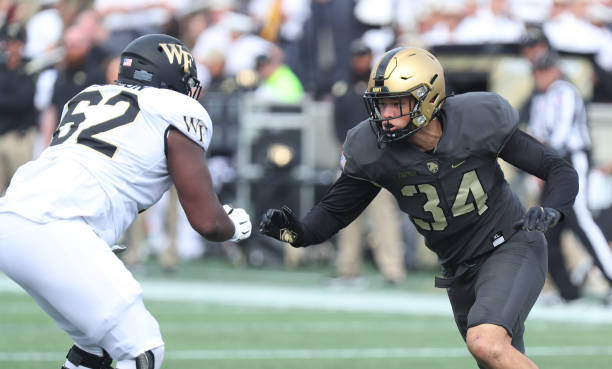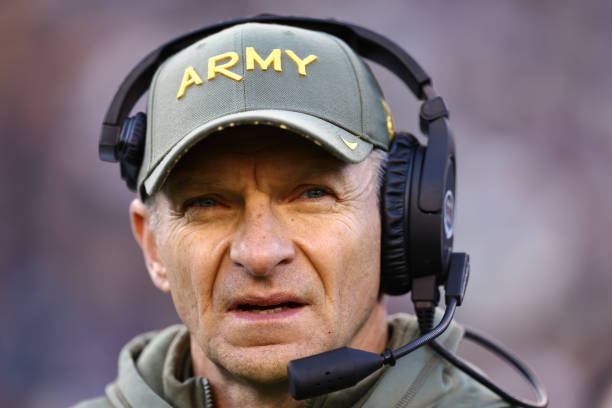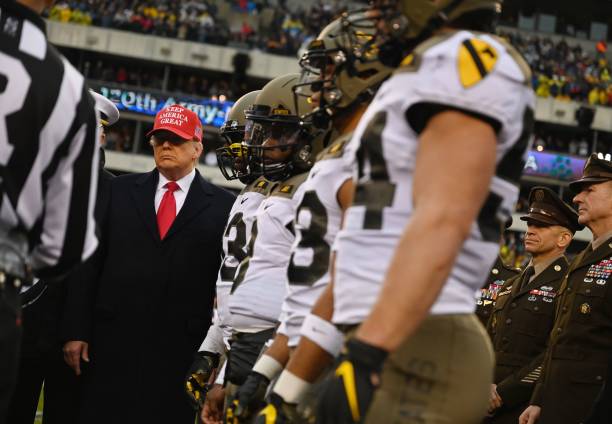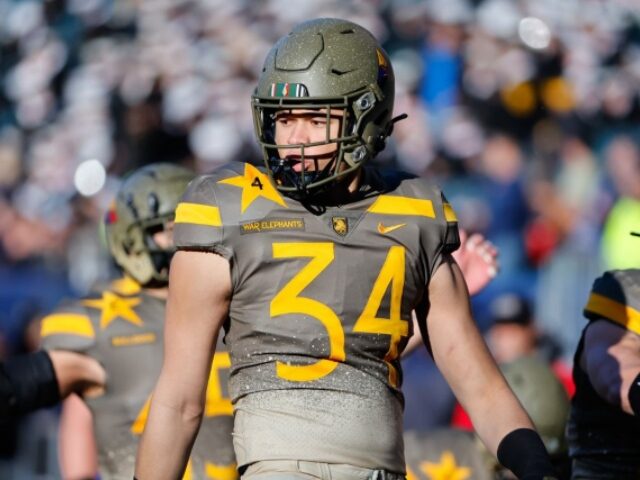The recently passed National Defense Authorization Act (NDAA) has changed the rules governing athletes from the Army, Navy, and Air Force and may now keep the Army’s Andre Carter II from joining the coming NFL Draft, keeping him from turning pro for years to come.
The linebacker is said to be a sure first-round draft pick if he were to turn pro for the coming NFL Draft, but the new bill that is soon to be signed into law by President Biden will change rules that allow military academy players to turn pro before their years of service to the military are satisfied first, ProFootballTalk reports.
The new NDAA contains language stating that an “agreement by a cadet or midshipman to play professional sport constitutes a breach of service obligation.” The new law adds, “The cadet may not obtain employment, including as a professional athlete, until after completing the cadet’s commissioned service obligation.”

Andre Carter II #34 of the Army Black Knights applies pressure against DeVonte Gordon #62 of the Wake Forest Demon Deacons during the game at Michie Stadium on October 23, 2021, in West Point, New York. (Edward Diller/Getty Images)
If the bill becomes law, Carter would not be allowed to jump from the service academy to the NFL and then serve five years in the military after his NFL career winds down. Instead, the new provisions would force him to serve his five years in the U.S. Army before he moved on to the NFL.
The new rule would put an end to the waivers given to other members of the service academies to jump right into a professional sports career right after graduation.
Carter’s mother has called the new rule “painful” and “really disappointing.”
“Here’s the thing that’s so painful,” Melissa Carter said. “You guide your son to do the right things because it’s right. And it’s really disappointing that it’s not reciprocated. This has been his goal since childhood, to go into the NFL. Every step of the way, that was on track, until we saw this article. That’s the part that’s disappointing. It’s not surprising to see so many people transfer, opt out or switch teams. When loyalty is not reciprocated, that stings.”
Army coach Jeff Monken was also unhappy with the new rules.
“It’s just kind of pulling the rug out from under him,” Monken told ESPN. “It’s not fair. It’s not fair to him. He was loyal to this team and institution. He could have left, and he didn’t. He still wants to serve. It’s not that he doesn’t want to serve. He wants to pursue the NFL and play, and then serve,” he said. “I’m 100 percent against it.”

Head coach Jeff Monken of the Army Black Knights looks on during the first quarter at Lincoln Financial Field on December 10, 2022, in Philadelphia, Pennsylvania. (Tim Nwachukwu/Getty Images)
Donald Trump felt that way, too.
In 2019, Donald Trump, who is a huge sports fan, signed a memorandum ordering the Pentagon to allow athletic standouts to play pro sports after graduation. Unfortunately, the new NDAA would also upend that order.

US President Donald Trump arrives for the coin toss before the Army v. Navy American Football game in Philadelphia on December 14, 2019. (Photo by Andrew Caballero-Reynolds / AFP) (ANDREW CABALLERO-REYNOLDS/AFP via Getty Images)
Other players, though, have been allowed to make compromises. In 2019, for instance, Minnesota Vikings Austin Cutting was able to strike a deal with the Air Force to serve his time with the military while playing for the Vikings after an appeal by President Trump. Cuttings washed out quickly, though, and is no longer an active player.
Naval Academy grad Malcolm Perry also got a waiver to push off his military service. He was drafted by the NFL in 2020. He played two short seasons in the NFL and retired this year.
There are four other Army grads now in the NFL, including Cole Christiansen (Chiefs), Brett Toth (Eagles), Elijah Riley (Steelers), and Jon Rhattigan (Seahawks).
Some worry that forcing top players to fulfill their military service before turning pro takes away their best playing years. But it isn’t axiomatic.
Several military academy football players have gone on to NFL success, most notably 1963 Heisman Trophy winner Roger Staubach, a quarterback for Navy from 1962-64. After graduation, Staubach went on to serve a tour of duty in Vietnam, then joined the Dallas Cowboys in 1969 and guided the team to two Super Bowl victories.
Follow Warner Todd Huston on Facebook at: facebook.com/Warner.Todd.Huston, or Truth Social @WarnerToddHuston

COMMENTS
Please let us know if you're having issues with commenting.